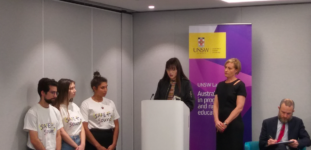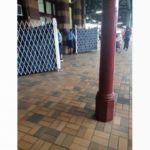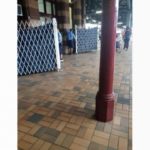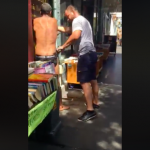NSW Police Must Be Stopped From Misusing Strip Searches

Over the last 12 years, the use of strip searches by NSW police has increased 20 fold, according to a just released report commissioned by the Redfern Legal Centre. In the 12 months to 30 November 2006, 277 strip searches were conducted, whereas in the 12 months to 30 June 2018, 5,483 were.
At the report release, 19-year-old Sydneysider Lucy Moore shared her story of being strip searched five months ago at a festival at Olympic Park. “Many of the things that happened to me that day,” the young woman bravely told the room, “I now know to be unlawful.”
“After being left naked, scared and humiliated in front of complete strangers, I was asked to squat and cough,” Moore continued, recalling one of the suspect aspects of the search. Others include the door being left half open during part of the time and officers refusing to identify themselves.
Not only did the officers make the teen remove her clothes without initially conducting a pat-down search, but when no drugs were found in her possession, they kicked her out of the event and banned her from the venue. “Since that day, I’ve had to live with the trauma,” she added.
But, disturbing as it is, Ms Moore’s story is no anomaly. As the figures convey, police are routinely searching people throughout the state. And what’s supposed to be a procedure of last resort, is now being applied in unwarranted circumstances by officers unaware of the proper procedures.
From last resort to routine
Rethinking Strip Searches by NSW Police was authored by UNSW law academics Dr Michael Grewcock and Dr Vicki Sentas. It’s a response to a situation that includes police regularly setting up screens at Central Station to make members of the public strip off on their way home from work.
“It’s about changing the conversation about policing in NSW,” explained Redfern Legal Centre head of police accountability Samantha Lee. “It’s a conversation that talks about minimising harms, securing dignity and still keeping the community safe.”
Ms Lee explained that the report recommends some modest changes to the Law Enforcement (Powers and Responsibilities) Act 2002 (NSW), also known as the LEPRA. It’s the legislation that contains NSW police strip search powers.
Data shows that over the four years to June 2018, of the close to 19,000 strip searches that were conducted statewide, illegal items were found in only 64 percent of cases. And further, over 2017-18, only 30 percent of strip searches resulted in charges being laid.
“The law in regard to strip searches is legalistic and vague. And police are struggling to understand the law on the ground,” Ms Lee made clear. “It’s time for change. It’s time for policing on the ground to ensure that strip searches are only conducted in the most exceptional circumstances.”
Misguided application
Section 31 of the LEPRA sets out that a search can be conducted outside of a police station when an officer “suspects on reasonable grounds” that it’s necessary that the individual strips off and there’s a “seriousness and urgency” about the circumstances that warrant the procedure be carried out.
“The current broadly-defined thresholds in LEPRA do not provide police with clear guidance on the objective reasons for which a strip search should be conducted, and greater clarity is required,” the report authors wrote.
The document also sets out that over 2018-19, when police held a reasonable suspicion that led to a strip search, it related to prohibited drug possession in 91 percent of cases. And around 80 percent of the time when drug charges are laid following a search, it’s over personal possession, not supply.
Aboriginal Legal Service managing advocate Jeremy Styles said many in criminal justice assert that personal drug possession should be treated as a health issue and no longer a crime. He added that this has been a long-standing position of the criminal law section of the NSW Bar Association.
“Increased searching by police is not appropriate – or an evidence-based approach – to ameliorate some of the harms that arise occasionally from drug use,” Mr Styles said. “Ultimately, these searches are criminalising users, and not addressing… drug use when it’s problematic.”
Racial profiling
Over the last three financial years, 10 percent of individuals strip searched by NSW police were Aboriginal or Torres Strait Islander people. However, First Nations peoples only account for 2.9 percent of the overall population in this state.
“We are seriously concerned about the disproportionate use of these powers on Aboriginal people. The 10 percent Aboriginal search rate is far greater than the outside range of Aboriginal population,” Mr Styles emphasised. “That gap in statistics looks a lot like racial profiling.”
Report author Dr Michael Grewcock added that the researchers had heard stories from regional communities in NSW about Aboriginal children being “stripped outside supermarkets, stripped at the school gate and being stripped in the back of police vans”.
Would otherwise constitute assault
“A strip search means being stripped naked by total strangers and often forced to contort into unusual positions: to bend over, to squat and cough,” Dr Grewcock set out. “If it was being conducted in absence of police powers, it would be an assault. And quite a serious assault.”
And the second issue Dr Grewcock pointed to is that the “fundamental escalation” in strip search use “doesn’t point to a change in human behaviour”, but rather “a change in police practice”. And the rise in strip search use is “fundamentally about drug possession”.
The doctor said that police are basing their reasonable suspicion on highly flawed drug dog indications, even though internal police documents state that this is not enough to constitute such a suspicion by itself. But, despite this, dog indications are regularly leading to strip searches.
“What we are seeing is an escalation of the war on drugs on the street, essentially around the question of strip searches, in ways that reconfigure the initial intention of the law,” Dr Grewcock put forth.
Achievable law reform
“Strip searches are not a normal part of policing,” report author Dr Vicki Sentas underscored. “Good policing relies on investigation. Strip searches are not an investigative tool. Strip searches are for genuine emergencies, where there is an imminent risk to someone’s safety.”
Dr Sentas outlined the twelve UNSW report recommendations “for achievable law reform”, which include the definition of a strip search in the LEPRA be made clearer, and the practice of squatting and coughing be banned.
Another key recommendation is “limiting strip searches in the field to reasonable suspicion of a dangerous weapon and drug supply offences”. As well, preventing immediate risk to safety or loss of evidence should constitute a reason for a search, but drug possession or deemed supply should not.
“We specifically recommend that the rules change for children,” Dr Sentas continued. She explained that there should be no strip searching of children, except in the case of their protection, and this should be done via a court order.
“I hope that the report today, released by Redfern Legal Centre, helps us find a way forward,” Ms Moore concluded her speech to the crowd. “A way to protect people without causing harm. Because no one deserves to go through what I did.”







